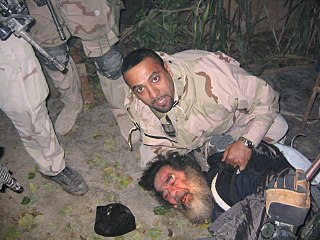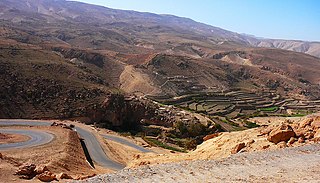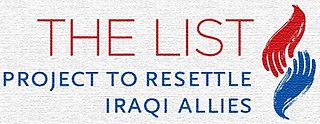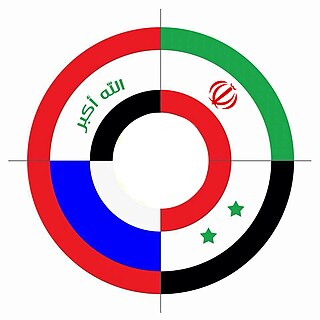
Saddam Hussein was an Iraqi politician, revolutionary and dictator who served as the fifth president of Iraq from 1979 to 2003. He also served as prime minister of Iraq from 1979 to 1991 and later from 1994 to 2003. He was a leading member of the revolutionary Arab Socialist Ba'ath Party and later its Iraqi regional branch. Ideologically, he espoused Ba'athism, a mix of Arab nationalism and Arab socialism, while the policies and political ideas he championed are collectively known as Saddamism.

This article describes the positions of world governments before the actual initiation of the 2003 invasion of Iraq, and not their current positions as they may have changed since then.

The International Rescue Committee (IRC) is a global humanitarian aid, relief, and development nongovernmental organization. Founded in 1933 as the International Relief Association, at the request of Albert Einstein, and changing its name in 1942 after amalgamating with the similar Emergency Rescue Committee, the IRC provides emergency aid and long-term assistance to refugees and those displaced by war, persecution, or natural disaster. The IRC is currently working in about 40 countries and 26 U.S. cities where it resettles refugees and helps them become self-sufficient. It focuses mainly on health, education, economic wellbeing, power, and safety.

Peter Gregg Arnett is a New Zealand-born American journalist. He is known for his coverage of the Vietnam War and the Gulf War. He was awarded the 1966 Pulitzer Prize in International Reporting for his work in Vietnam from 1962 to 1965, mostly reporting for the Associated Press.

The Occupation of Iraq (2003–2011) was characterized by a large United States military deployment on Iraqi territory, beginning with the US-led invasion of the country in March 2003 which overthrew the Ba'ath Party government of Saddam Hussein and ending with the departure of US troops from the country in 2011. Troops for the occupation came primarily from the United States, the United Kingdom, and Australia, but 29 other nations also provided troops, and there were varying levels of assistance from Japan and other countries, as well as tens of thousands of private military company personnel.

Saddam Hussein, the deposed president of Iraq, was captured by the United States military in the town of Ad-Dawr, Iraq on 13 December 2003. Codenamed Operation Red Dawn, this military operation was named after the 1984 American film Red Dawn.
"The Omega Glory" is the twenty-third episode of the second season of the American science fiction television series Star Trek. Written by Gene Roddenberry and directed by Vincent McEveety, it was first broadcast March 1, 1968. In the episode, Captain Kirk must find the cure to a deadly disease and put an end to another Starfleet captain's cultural interference. The story was one of three outlines submitted for selection as the second pilot of Star Trek, the others being "Mudd's Women" and "Where No Man Has Gone Before".

Veterans for Peace is an organization founded in 1985. Initially made up of US military veterans of World War II, the Korean War and the Vietnam War - later including veterans of the Gulf War, the War in Afghanistan and the Iraq War - as well as peacetime veterans and non-veterans, it has since spread overseas and has an active offshoot in the United Kingdom. The group works to promote alternatives to war.

Patrick Joseph Murphy is an American politician and attorney who served as the 32nd United States Under Secretary of the Army. He was the first veteran of the Iraq War to be elected to the United States House of Representatives, representing Pennsylvania's 8th congressional district from 2007 to 2011. Murphy is a former anchor of Taking the Hill on MSNBC. Murphy is currently on the faculty of Wharton Business School and the Distinguished Chair of Innovation at the United States Military Academy.
Frederick C. Cuny was an American humanitarian whose work spanned disaster relief, refugee emergency management, recovery from war and civil conflict as well as disaster and emergency preparedness, mitigation and peacebuilding. He was first and foremost a practitioner, but also a prolific author, an educator and a field-based researcher. He has been described as "a great American – a sort of universal Schindler, a man with lists of millions of people in Asia, Africa, Latin America and Europe whose lives he succored or saved." Another tribute to Cuny claimed that he "was one of the world's most accomplished disaster relief experts, both a pioneer and an iconoclast in the field of international humanitarian aid."

The 1991 Iraqi uprisings were ethnic and religious uprisings against Saddam Hussein's regime in Iraq that were led by Shia Arabs and Kurds. The uprisings lasted from March to April 1991 after a ceasefire following the end of the Gulf War. The mostly uncoordinated insurgency was fueled by the perception that Iraqi President Saddam Hussein had become vulnerable to regime change. This perception of weakness was largely the result of the outcome of the Iran–Iraq War and the Gulf War, both of which occurred within a single decade and devastated the population and economy of Iraq.

Refugees of Iraq are Iraqi nationals who have fled Iraq due to war or persecution. In 1980- 2017, large number of refugees fled Iraq, peaking with the Iraq War and continuing until the end of the War in Iraq (2013–2017). Precipitated by a series of conflicts including the Kurdish rebellions during the Iran–Iraq War, Iraq's Invasion of Kuwait (1990) and the Gulf War (1991), the subsequent sanctions against Iraq (1991–2003), culminating in the Iraq War and the subsequent War in Iraq (2013–2017), millions were forced by insecurity to flee their homes in Iraq. Iraqi refugees established themselves in urban areas in other countries rather than refugee camps.

No End in Sight is a 2007 American documentary film about the American occupation of Iraq. The directorial debut of Academy Award-winning documentary filmmaker Charles Ferguson, it premiered on January 22, 2007, at the Sundance Film Festival and opened in its first two theaters in the United States on July 27, 2007. By December of that year, it had a theatrical gross of $1.4 million. The film was nominated for Best Documentary Feature at the 80th Academy Awards.

Perlasca – Un eroe Italiano is a 2002 Italian drama, directed by Alberto Negrin, about Giorgio Perlasca, an Italian businessman working in Hungary for his government. After the surrender of Italy to the Allies, he took refuge in the Spanish embassy. Aware of the threat to Jews, he first began to help them find shelter in Spanish safe houses.

Kirk Thomas Cameron is an American actor, evangelist, and television host. He first gained fame as a teen actor playing Mike Seaver on the ABC sitcom Growing Pains (1985–1992), a role for which he was nominated for two Golden Globe Awards.

Kirk Wallace Johnson is an American author, journalist, and founder of The List Project, a not-for-profit organization that helps resettle Iraqi refugees who previously worked for the U.S. government during the Iraq War. He served as the U.S. Agency for International Development regional coordinator for reconstruction in Fallujah, Iraq in 2005.

The Sinjar massacre marked the beginning of the genocide of Yazidis by ISIL, the killing and abduction of thousands of Yazidi men, women and children. It took place in August 2014 in Sinjar city and Sinjar District in Iraq's Nineveh Governorate and was perpetrated by the Islamic State of Iraq and the Levant (ISIL). The massacre began with ISIL attacking and capturing Sinjar and neighboring towns on 3 August, during its Northern Iraq offensive.

The List Project is a non-profit foundation that was established on June 20, 2007. It assists Iraqi refugees who have worked for U.S-affiliated organizations throughout the Iraqi war in obtaining visas and relocating to the U.S. It is recognized as a U.S. 501(c)(3) non-profit organization under the Tides Center.
No One Left Behind (NOLB) is a charity and veteran service organization that was founded by a US Army Captain Matt Zeller and his Afghan Interpreter, Janis Shinwary. Other co-founders include U.S Army Captain Jason S. Gorey and Brian Steblay. NOLB provides emergency financial aid, employment opportunities, and used vehicles to former Afghan and Iraqi interpreters who resettle in the United States through the Special Immigrant Visas program. Over 50,000 interpreters served with United States forces in Afghanistan and Iraq since the attacks of September 11, 2001. No One Left Behind operates as a nonprofit 501(c)(3) organization.

The Russia–Syria–Iran–Iraq coalition, also referred to as 4+1, is a joint intelligence-sharing cooperation between opponents of the Islamic State (IS) with operation rooms in Syria's Damascus and Iraq's Green Zone in Baghdad. It was formed as a consequence of an agreement reached at the end of September 2015 between Russia, the Islamic Republic of Iran, Iraq and the Syrian Arab Republic to "help and cooperate in collecting information about the terrorist Daesh group" (ISIL) with a view to combatting the advances of the group, according to the statement issued by the Iraqi Joint Operations Command. The statement also cited "the increasing concern from Russia about thousands of Russian terrorists committing criminal acts within ISIS."
















